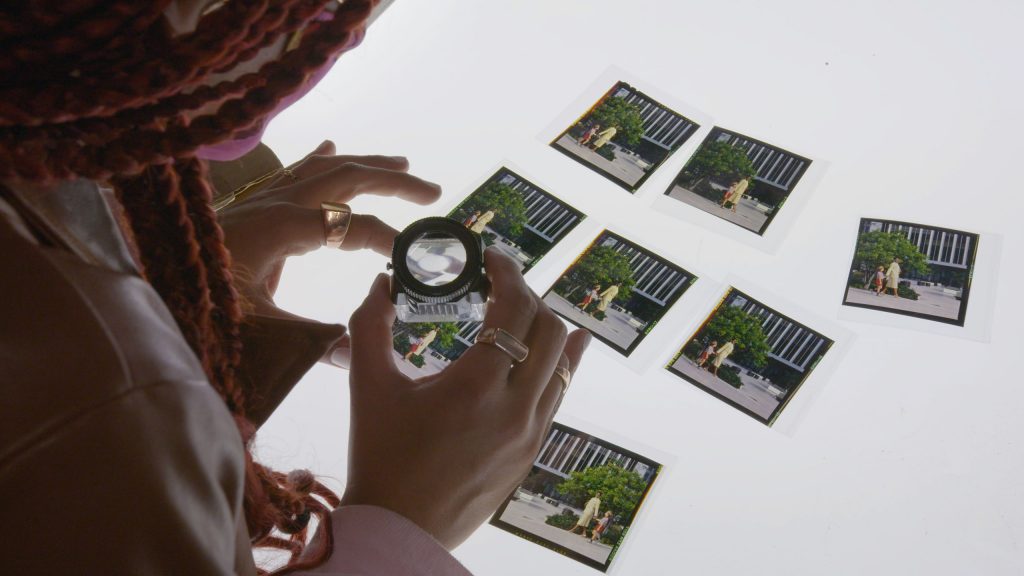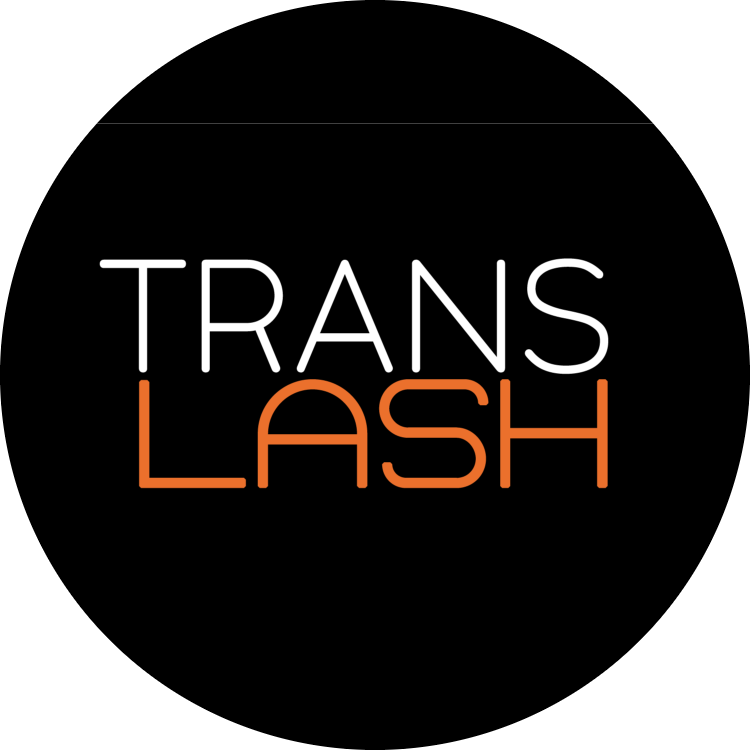By Daniela “Dani” Capistrano for TransLash Media
At the Seeking Mavis Beacon world premiere at Sundance Film Festival on January 20, I asked director Jazmin Renée Jones (she/they) why there was so much beautiful imagery of queer and trans lives in her feature debut about the mysterious Black woman behind the avatar in the iconic 80s typing software Mavis Beacon Teaches Typing.
Is Seeking Mavis Beacon part of queer and trans cinema? After thanking me for giving them the opportunity to answer this specific question, this was Jones’ response:
Q&A TRANSCRIPT
Jazmin Renée Jones: As a Black, queer, non-binary filmmaker, there’s no question that this is a Black film. It’s just, it’s Black cinema. Me being Black, regardless of what the subject of my film is, it’s a Black film. And I think it’s really interesting that queer cinema, it’s a little trickier. And it’s like, I think this [their film] is queer cinema. Olivia and I are gay as hell, but but it’s like absent of a love plot. It’s like we don’t qualify. And I think queer cinema is also just like, hey we’re queers, we’re out here.
Olivia McKayla Ross (associate producer and protagonist): It’s like we’re queering cinema [audience laugher]. Like, well, there’s a divestment I think from like a normative way of understanding the traditional structures that are upholding how what we deem is like a regular way to behave. And we bring as like, investigators, a femme politik to even encounter people’s space. And sometimes even overdoing it with like apologizing a lot, knocking on doors in a kind of way where like, it’s very common with investigative documentaries, you just have someone like waving a camera in your face, and like being very, um, there’s like a sense of like “it is my right because I’m holding a camera” and there’s these like dude, dude bro, like true crime. Yeah.
So I think there’s a way in which, um, like the fact of our queerness embeds in everything that we’re doing. And also the lessons I think, like, that we learn from queer and trans people of history about representation and how it can be a trap [muffled]. Invisibility the entire, yeah having visibility and having a voice…
Jazmin Renée Jones: Another thing, I think, coming back to your question too, we had a really interesting experience, Olivia and I. We went to film at a certain queer archive and the question came up of like why would we let you film here, your movie isn’t queer. And then we were like but no, we are, and then they’re like but your subject isn’t queer, and we’re like you got us there, maybe, I don’t know. I haven’t talked to her about that yet. So I think in general, I just, I’m excited for this to be in conversation with other queer films.
Olivia acknowledged that we spent a lot of time studying the hero’s journey and then the heroin’s journey, which I really love, um, but I also found it to be incredibly clunky in its gendered language, and so, it’s like I had to like translate like the divine feminine. And like okay that means intuition.
And so if anybody here also would like to work on like a gender nonconforming Journey which is basically us figuring out the principles of that without all of this gendered language, I would love that um, so yeah thank you.
Guetty Felin (producer): You’ve done it with Seeking Mavis Beacon.
Jazmin Renée Jones: Thank you.
FAMILY DYNAMICS IN SEEKING MAVIS BEACON
Call it a “Sundance moment”: I serendipitously sat down with several of Jazmin’s family members at a cafe near the Seeking Mavis Beacon premiere on my way to the press line, before having any idea who they were. I had seen an open chair at a table and politely asked if I could use it, and was immediately invited to take a seat with the family. We easily fell into conversation, and upon learning what I was there for, Jazmin’s mother shared with a big smile that they (Jazmin’s parents, step-parents, and more) were there for the same film too.
As I looked around the table in awe, I told them what a beautiful gift it was for me to witness such a unified front for Jazmin. Even though I didn’t know her and hadn’t seen her film yet, it meant so much to see a fellow queer and non-binary person being supported in big ways by their blood and chosen family on their special day.
I didn’t have to tell them that I and other queer and trans people don’t always get this support. I could tell they already knew.
My brief time sharing space with Jazmin’s family was filled with their father and step-father trading anecdotes about her always having a camera in her hand, the warm tones of their voices full of pride and nostalgia. Jazmin’s mother’s phone then dinged with a notification, followed by her alerting the table that Jazmin had asked that they meet her at the press tent.
Since I knew where it was, I offered to guide them there. “You’re our angel,” Jasmin’s mother said as I led them out the door, and we made our way through the snow to the little white tent where Jazmin was waiting inside.
From a respectful distance, I watched as Jazmin’s family celebrated her getting her flowers, then joining her for photos on the red carpet. As Jazmin’s mother walked over to me, I thanked her again for the shared moment and congratulated the family before I stepped away to find the passholder line for the screening so I could get a good seat.
Queer Family Legacies
Once inside the theatre, I was immediately surprised and delighted to see up on the big screen several of those same family members I had sat with in the cafe. Between scenes of their investigative work, Jazmin wove in the ways that her family held space for them and offered advice along her years-long journey to find the elusive woman behind one of her favorite childhood computer games.
Jazmin also included scenes of herself with vibrant queer and trans chosen family; her own angels supporting her on her quest for truth and resolution. Queerness and transness is embedded so deeply in the film that it seems impossible that anyone could watch this movie and not call it queer cinema.
Seeking Mavis Beacon tenderly holds a story about a Black woman’s fight for control over her own likeness and right to privacy, while Jazmin and Olivia experiment with subverting technology to find her—and the truth about themselves.
While I thought I was going to watch a film about the intersection of race, gender, and technology, what I experienced was a fascinating and complex story about the ways we as queer and trans people—especially Black and brown LGBGTQ+ folks—find representation in media that wasn’t necessarily created for us, cultivating family online and offline in traditional and nontraditional ways.

If we choose it, we can use technologies as tools to help us unlock the truth about who we are, while fostering familial connections along our path to self-actualization and healing.
Will a future e-girl/e-person make a film about seeking Jazmin Renée Jones because they saw so much of themselves in Seeking Mavis Beacon? I’m betting on it happening sooner than you think.
MAVIS BEACON TEACHES TYPING IS COMPLICATED BLACK REPRESENTATION IN TECH
One of the most influential Black women in technology is a figment of our collective imagination. The co-founder of Myspace invented Mavis Beacon to sell the world’s most popular typing software, but the real woman she was modeled after disappeared in 1995.
Seeking Mavis Beacon poses critical questions regarding anthropomorphization and the consumption of marginalized bodies in the tech industry, while reimagining the legacy of a missing historical figure.
Launched in the late ’80s, educational software Mavis Beacon Teaches Typing taught millions globally, but the program’s Haitian-born cover model vanished decades ago. In Seeking Mavis Beacon, two DIY investigators search for the unsung cultural icon, while questioning notions of digital security, AI, and Black representation in the digital realm.
TransLash’s guide to the 40th annual Sundance Film Festival will be released during this year’s fest. Subscribe to our newsletter to access our guide: www.translash.org/connect
Did you find this resource helpful? Consider supporting TransLash today with a tax-deductible donation. Did we miss anything? Let us know and we’ll update the guide with your suggestion, crediting you as the contributor.


